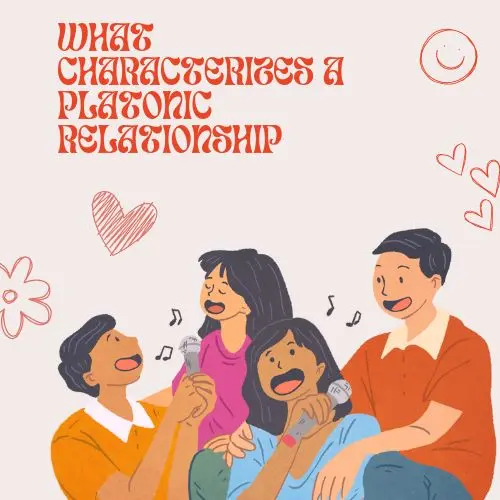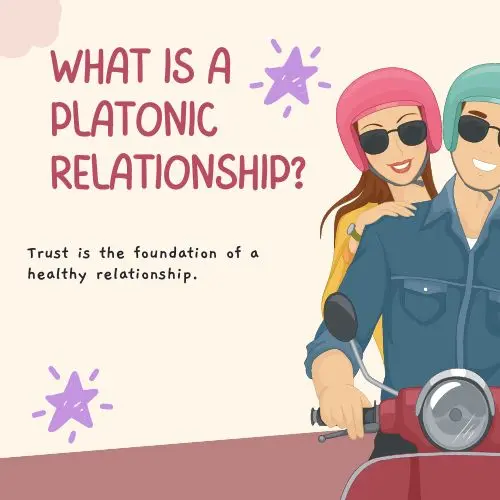Introduction
A platonic relationship is a close, intimate, affectionate—yet non-sexual and non-romantic—friendship between two people. While platonic friendships can occur between same-sex friends, the term is more commonly used to describe relationships between members of the opposite sex.
| Percentage of cross-sex friendships that remain platonic | 80-90% |
| Percentage of people who have had a platonic opposite-sex friend | 60% |
| Percentage of platonic friendships that involve some attraction | 30-40% |
What Characterizes a Platonic Relationship

What defines friendship at its core is affection, knowledge, and regard for each other, which exists between people without any physical or romantic attraction. In relationships of this kind, there is a mutual love devoid of selfishness and emotional closeness akin to what happens in a romantic relationship but without sexual desire or passion.
Some people may see platonic relationships as uncommon and difficult to maintain, yet they are more widespread than one can imagine and play an invaluable role in our lives. Let us now consider what characterizes the unique bonds.
Connection Without Physical Attraction
The defining quality of a platonic relationship is the lack of sexual or physical attraction between two people. While participants in platonic relationships may recognize that their friend is objectively attractive, the thought of being intimate with them feels foreign and uncomfortable.
There is an innate understanding that both parties value the emotional intimacy of the relationship too much ever to risk complicating it physically. This allows platonic friends to connect without romantic pressures, expectations, or awkwardness.
Emotional Intimacy
Platonic relationships involve a depth of emotional intimacy and understanding comparable to that of romantic partners. Platonic friends confide in one another, provide emotional support, and honestly self-disclose vulnerabilities, fears, dreams, and inner experiences.
This emotional intimacy develops because platonic friends know their connection cannot and will not ever become sexual. With that “possibility” eliminated from the start, the relationship unfolds gradually and organically based solely on verbal and emotional communication.
Lack of Jealousy
An absence of jealousy commonly characterizes platonic relationships. Because there is zero risk or concern about physical interest or infidelity, platonic partners do not feel envious or threatened by their friend’s attention to or relationships with other people.
Rather, platonic friends support their partner’s outside relationships and enjoy seeing their friend happy. They understand their special emotional intimacy is not compromised by external relationships pursued for different reasons.
Non-Possessiveness
Similarly, possessiveness does not exist in platonic friendships. Platonic partners enjoy complete connection and freedom without fear or concern over the relationship’s dissolving. The emotional intimacy of the relationship fosters confidence that the friendship can weather external activities or distractions while remaining intact.
Ultimately, because friends do not “own” or “control” one another in a platonic partnership, these relationships embody far more balance and longevity than most romances.
What Brings Platonic Relationships Fulfilment?

People enter into platonic relationships for multidimensional fulfillment emotionally, socially, and psychologically that they cannot find in romantic or familial relationships alone.
Emotional Support
A significant benefit of platonic friendships is receiving and providing unconditional emotional support free from judgment about vulnerability. Platonic partners serve as one another’s soft space to fall when going through hard times.
Through radical listening and sharing without criticism or forced advice, platonic friends validate one another during ups and downs. This creates a safe harbor to process difficulties and celebrate milestones that people often cannot find, even in romantic relationships.
Freedom from Social Expectations
Socially, platonic relationships provide refuge from the expectations people feel in romantic, parental or peer relationships. There is comfort in having at least one connection operating entirely on its own wavelength without external pressures or precedents impacting the dynamic.
Platonic partnerships are a middle ground, free from the intensity of romance or family ties, where people can enjoy companionship. There’s very little drama, because friction requires foothold—and platonic relationships start with a clean slate.
Self-Understanding Through Opposite Sex Insights
Another underrated benefit is the window platonic friendships with someone of the opposite sex can provide into gendered patterns of thinking and behaving.
Processing dating experiences, dynamics with children, or professional challenges with a trusted confidant of the opposite sex provides invaluable insight into perspectives they otherwise may lack self-awareness. This allows people to become better romantic partners as well as parents.
Personal Growth
Overall, few relationships foster personal growth like platonic friendships. The combined freedom and intimacy platonically connected people share allow for radical honesty, zero judgment, and continuous encouragement between both parties.
Rather than simply enabling each other’s strengths and weaknesses like most social ties, platonic friends deliberately push one another to develop emotionally, professionally, and psychologically within a caring container. The result is an acceleration in maturity unmatched by other types of soul connections.
Can Romantic Relationships Evolve Into Platonic Ones?

A question that often arises about platonic love is whether romantic relationships or entanglements can evolve into platonic friendships. The answer is complex but under specific conditions where connection overrides chemistry.
Ideally, certain ground rules must be set from the start, including:
- Zero sexual contact or physical intimacy – Any degree of physical intimacy raises questions and confusion.
- Space between transition – Jumping straight from romance to friendship is emotionally complicated. A 6-month breather allows feelings to neutralize and roles to reboot.
- Established boundaries – Both parties must discuss concrete platonic friendship rules around communication frequency, information sharing, activities done together, possession of belongings, space sharing, and privacy. Ambiguity invites trouble.
If these guidelines aren’t mutually understood and adopted from the beginning, evolving a romantic connection into “just friends” status almost always backslides or ends in heartbreak. However, for those rare occasions when couples deeply bond but lack physical chemistry, the effort can result in a beautiful, lifelong platonic friendship.
Challenges Creating and Sustaining Platonic Relationships

Of course, despite their profound gifts, platonic relationships come with their own complications and obstacles to forming and maintaining.
Society Doesn’t Understand Them
Probably the biggest challenge facing platonic connections is their misperception by society. Those unaware of these relationships commonly misconstrue them as secret affairs, asexuality on the part of one or both parties or unhealthy attachments stemming from a dysfunctional upbringing or psychological wounds.
In reality, nothing could be further from the truth. But unfortunately, until more people understand the genuine nature of platonic intimacy, friends must brace themselves for awkward or insulting assumptions from outsiders about their special bond.
Risk of Unrequited Desire
No matter how clearly defined, there’s always a small risk in intensely intimate opposite-sex friendships that one party covertly harbours or develops amorous feelings over time. Even if never revealed or acted upon, one person feeling attracted threatens to compromise the platonic partnership permanently.
Sometimes, unacknowledged romantic affection is misinterpreted or projected so stealthily that even the person experiencing it isn’t fully aware until later. Other times, it’s deliberately suppressed dishonestly. Regardless, it only takes one person catching feelings to destabilize everything.
Lack of Emotional Boundaries
Becoming so emotionally intimate with a trusted confidant that normal relational filtering and privacy walls crumble can also create issues. Without some degree of emotional regulation, even platonic partners may unconsciously trauma bond, overshare, or lean on one another in unhealthy, unbalanced ways.
Partners providing emotional support 24/7 with endless empathy and zeroiptables boundaries often enable toxic behaviors or thinking patterns in their friends rather than helping them heal. Platonic intimacy magnifies the risk of accidental damage via under-boundary attempts at nurturing.
Jealous New Romantic Partners
Finally, skepticism about platonic friendships doesn’t always remain outside. The same societal prejudice devaluing platonic connections often rears its head when a new romantic interest enters the picture.
New boyfriends, girlfriends, and spouses commonly demonstrate intense jealousy, resentment, or even demands to end the friendship completely. Their discomfort may directly stem from the mainstream lack of understanding of platonic love…but their mandates still strain the friendship.
Ultimately, friendship preservation comes down to setting priorities and boundaries with the new partner early on, such as honoring long-term platonic partnerships. Failure to require respect often results in losing the emotional intimacy and history with a beloved confidant.
Conclusion
Like any treasured connection, fulfilling platonic relationships requires ongoing effort. But the rewards of having someone to confide in, grow with, and feel safe with unconditionally outweigh the struggles exponentially.
If navigating a platonic partnership, be patient with yourself and your friend as you establish boundaries. Expect outside skepticism, but pay it no mind. Clarify mutual intentions and relationship priorities often as people and circumstances evolve.
Most importantly, approach the friendship first and foremost from a place of care – prioritizing your friend’s emotional needs as you know they prioritize yours. This mindset alone will resolve 90% of problems before they start.
At its core, a platonic bond reflects the highest form of love between humans – unconditional, unconstrained emotional intimacy and support. Despite their rarity, these relationships constitute life’s greatest gift for those capable of cultivating connection without physical attraction.
So, in closing, may we all have the courage to nurture platonic love in our lives. Society may eventually progress in defining relationships not by physical intimacy but by the depth of heart and soul.


What i don’t realize is in truth how you are no longer really a lot more neatly-preferred than you may be right now. You are very intelligent. You already know thus significantly relating to this matter, made me in my view believe it from a lot of varied angles. Its like men and women don’t seem to be interested unless it¡¦s something to accomplish with Woman gaga! Your individual stuffs great. Always care for it up!